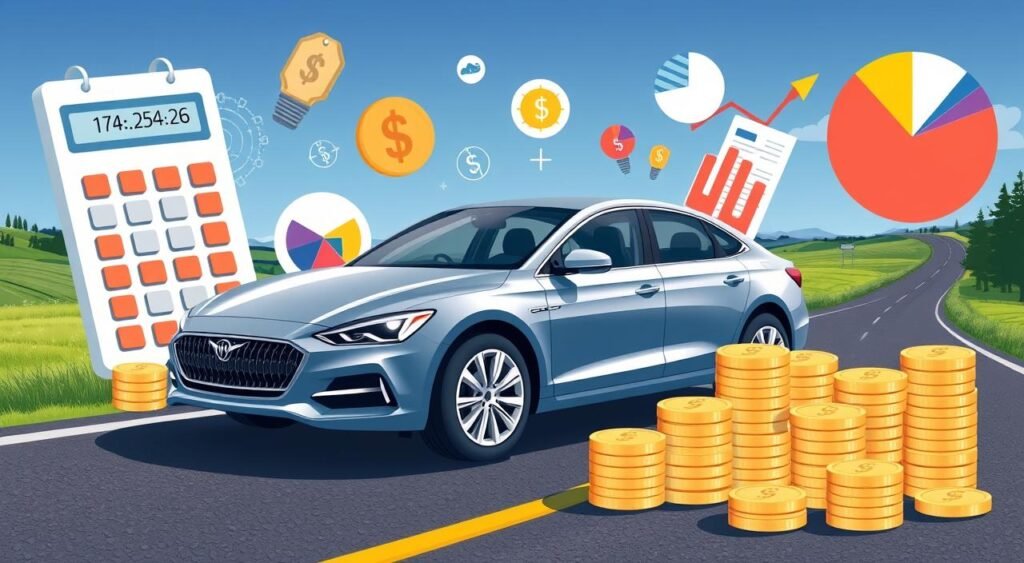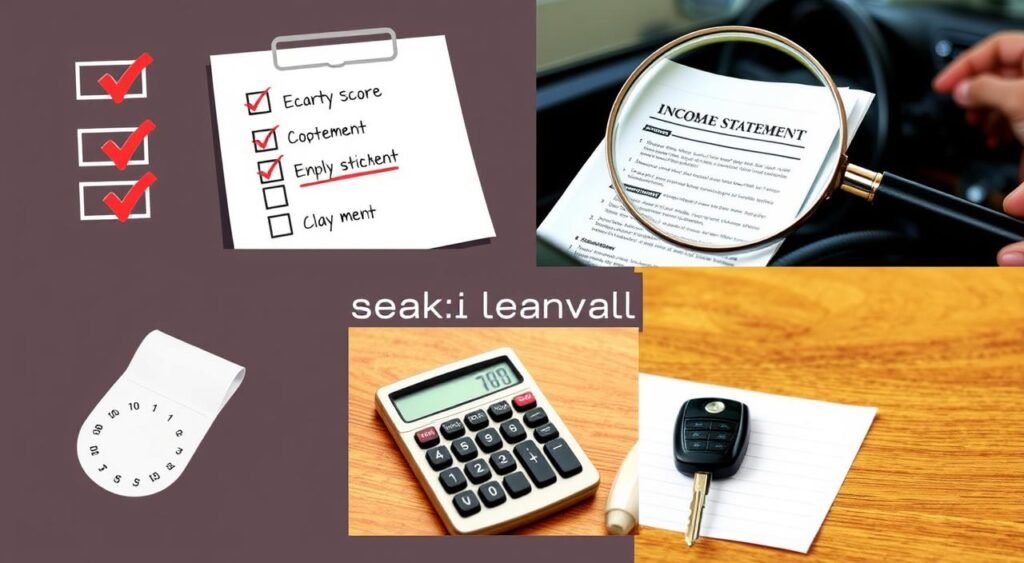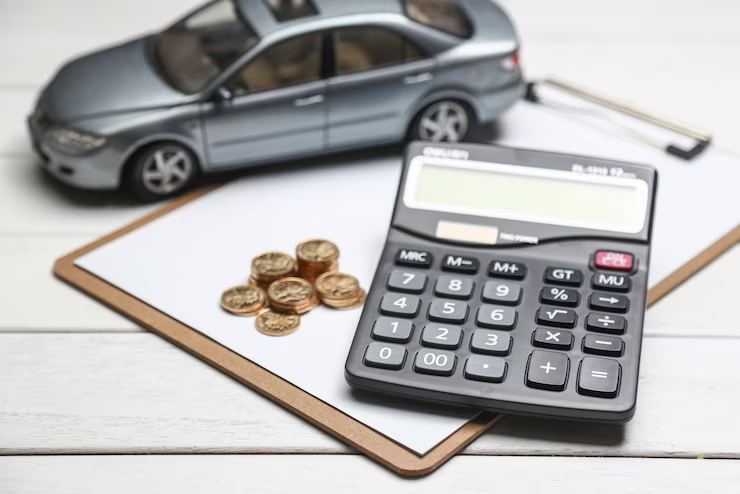In today’s fast-paced world, having a car is a must. Public transport can be tough, making cars a better choice. Buying a car is a big step, and getting an auto loan helps finance it. But, applying for loans without thinking about the costs can be tough.
This article offers tips to make the process easier. We cover the loan cost, who can get a loan, interest rates, loan length, and if you can afford it. These are key points to think about when looking into car loans.
Key Takeaways
- Understand the total cost of a used car loan, not just the monthly payments.
- Research your loan eligibility and compare interest rates from multiple lenders.
- Choose a loan term that aligns with your budget and financial situation.
- Ensure your used car loan is affordable and won’t overstretch your finances.
- Prepare your finances by clearing any outstanding debts and exploring financing options.
Why Used Car Loans Matter
Buying a used car is a great way to get a vehicle for less money. Even though used car prices have gone up, they’re still much cheaper than buying a new car. The average used car price was $25,638 in February 2024, while new cars cost about $47,142. But saving money isn’t the only thing to think about when buying a used car.
To make a used car purchase a good choice, buyers should watch out for red flags and take steps to lower their risks. Here are a few key reasons why used car loans are important:
- Potential Savings: Buying used can save a lot of money compared to new cars. This lets buyers stretch their budget.
- Reduced Depreciation: Used cars don’t lose value as fast, so their worth stays better over time.
- Broader Selection: The used car market has more makes, models, and features. This gives buyers more choices to find the right car.
- Mitigating Risks: Doing your homework and being careful can help used car buyers spot and avoid problems. This makes owning a car more reliable and satisfying.
Understanding the benefits and things to consider with used car loans helps buyers make smart choices. These choices should match their budget and what they need for transportation in the long run.
| Metric | Used Car | New Car |
|---|---|---|
| Average Price | $25,638 | $47,142 |
| Depreciation Rate | Slower | Faster |
| Selection | Wider | Limited |
| Risk Mitigation | Requires Due Diligence | Relatively Lower |
By thinking about the good and bad of used car loans, buyers can make choices that fit their budget and future car needs.
Understand the Total Loan Cost

When looking for a used car loan, don’t just focus on the monthly payment. A low monthly payment might seem good, but it can mean higher interest rates and a bigger total cost over time. Choosing a short-term loan with a bit higher monthly payment can actually save you money. This is because it avoids the high interest costs of long-term loans.
Look Beyond Monthly Payments
First, think about the total loan amount, including interest. Pick an affordable monthly payment instead of just the lowest one. This way, you avoid getting stuck with high-interest rate and long-term cost loans. These loans might seem okay at first but can cost more over time.
| Loan Details | Short-Term Loan | Long-Term Loan |
|---|---|---|
| Loan Amount | $20,000 | $20,000 |
| Interest Rate | 5% | 8% |
| Loan Term | 36 months | 60 months |
| Monthly Payment | $589 | $388 |
| Total Interest Paid | $1,923 | $3,280 |
| Total Loan Cost | $21,923 | $23,280 |
The table shows that a short-term loan with higher monthly payments costs less overall than a long-term loan with lower payments but higher interest rate and total interest payment. Knowing the total loan cost helps you make a better choice. You can find a used car loan that suits your budget and financial goals.
used car loan: Research and Preparation

Before you apply for a used car loan, it’s key to know if you qualify and what interest rates you might get. A good credit score can help you find better options and lower auto loan rates. But don’t think the dealer will give you the best deal. It’s smart to look around and compare offers from banks, credit unions, and online retailers.
Check Your Loan Eligibility
Start by checking if you’re eligible for a loan. Look at your credit history, income, and debts. This will tell you what interest rates you might get, which is key for getting a good deal. Getting preapproved for financing before you go to the dealership can also strengthen your position when talking about dealer financing.
Compare Interest Rates
It’s important to look at and compare interest rates from different places to get the best deal on your used car loan. Check out options from banks, credit unions, and online lenders to see what rates you might get. Knowing this can help you negotiate better with the dealership, as you’ll know the auto loan rates you can get elsewhere.
| Lender | Interest Rate | Loan Term | Monthly Payment |
|---|---|---|---|
| Bank A | 5.99% | 60 months | $350 |
| Credit Union B | 4.75% | 48 months | $425 |
| Online Lender C | 6.25% | 72 months | $300 |
By doing your homework on your loan eligibility and comparing interest rates, you’ll be ready to negotiate the best deal on your used car loan.
Loan Term and Affordability

Financing a used car means looking at the loan term closely. A longer loan term can mean lower monthly payments. But, it also means paying more interest over time. A shorter loan term, like 5 years, can help you pay off the debt quicker and save on interest.
Finance Within Your Means
Finding the right balance between the loan term and your repayment ability is key. Your monthly payment should fit your budget. This includes your credit score, outstanding debts, and credit history. A smaller down payment can mean a higher monthly payment, so keep that in mind.
To make sure you can afford the car, follow these tips:
- Choose a loan term of 5 years or less to pay off the debt faster and save on interest.
- Figure out the highest monthly payment you can handle. Consider your income, debts, and other financial duties.
- Look at your credit score and credit history to see what loans you can get and negotiate better interest rates.
- Think about making a bigger down payment to cut the loan amount and lower your monthly payments.
By thinking about the loan term, your repayment ability, and your finances, you can find a used car loan that works for you. This way, you can reach your transportation goals without financial stress.
Financial Preparedness

Before you apply for a used car loan, make sure your finances are in check. Paying off debts like credit card debt or other personal debt can really help your credit score. This shows you can handle repayments well. It also makes you more likely to get the loan and might get you a better interest rate.
Clear Outstanding Debts
It’s wise to clear your debts before getting a used car loan. Lenders look at your debt-to-income ratio closely. Having no debts makes you a more appealing borrower. So, pay off your credit cards, personal loans, or any other debts before applying for financing.
Research Financing Options
Look into different financing options to find what works best for you. Compare offers from banks, credit unions, and online lenders for the best interest rates and terms. Also, think about dealership financing. They might offer special deals or rates if you have a down payment ready.
Knowing your finances and the financing options available will help you get a used car loan that fits your budget and financial goals.
Also Read: How Bridge Loans Can Ease Your Transition Between Homes
Conclusion
Getting a used car loan needs careful research, preparation, and planning. You should understand the total loan cost and check if you’re eligible. Also, compare interest rates to find the best deal for you.
Think about the loan term and how it fits your budget. Make sure the monthly payments won’t strain your finances. Also, get your finances in order by paying off debts and looking into different financing options.
By focusing on your budget and doing your homework, you can get a good deal on a used car. Avoid common mistakes by staying alert and making smart choices. With the right approach, you’ll soon be driving your ideal vehicle.
FAQs
Q: What is an auto loan and how does it work?
A: An auto loan is a type of financing that allows you to borrow money to purchase a vehicle. You agree to pay back the loan amount, plus interest, over a set period. The lender holds the title until the loan is paid off, and the car becomes collateral for the loan.
Q: How can I estimate my monthly car payment for a used auto loan?
A: You can estimate your monthly car payment using an auto loan calculator. This tool allows you to input the loan amount, interest rate, and loan term to get an estimate of your monthly payments.
Q: What factors affect auto loan rates for used vehicles?
A: Auto loan rates for used vehicles are influenced by several factors, including your credit score, the loan term, the lender’s policies, and the age and condition of the car. Generally, a higher credit score can lead to lower auto financing rates.
Q: How does my credit score impact my ability to get a used auto loan?
A: Your credit score significantly impacts your ability to secure a used auto loan. Lenders use your credit score to assess your creditworthiness, which affects the loan amount, terms, and interest rates you may qualify for.
Q: Can I refinance my existing auto loan for a better rate?
A: Yes, you can refinance your existing auto loan to potentially secure a lower interest rate or better terms. This can help reduce your monthly car payment and the total interest paid over the life of the loan.
Q: What are the eligibility requirements for a Bank of America auto loan?
A: Eligibility requirements for a Bank of America auto loan typically include a minimum credit score, proof of income, and a valid driver’s license. Specific requirements may vary, so it’s best to check directly with the bank.
Q: What is the difference between a new and used car loan?
A: A new car loan is used to purchase a brand-new vehicle, while a used car loan is for purchasing a pre-owned vehicle. Generally, new car loans may offer lower interest rates and longer terms compared to used auto loans.
Q: How can I apply for a loan to buy a car?
A: To apply for a loan to buy a car, you can visit a lender’s website or a bank branch. You’ll need to provide personal information, financial details, and any necessary loan documents. It’s also advisable to check your credit score beforehand.
Q: Are there any rate discounts available for auto financing?
A: Yes, some lenders offer rate discounts for auto financing, especially for customers with excellent borrower credit history or for those who set up automatic payments. It’s worth inquiring about available discounts when applying for your loan.
Q: What should I know about the terms and conditions of a used auto loan?
A: When considering a used auto loan, make sure to review the terms and conditions carefully. Pay attention to the annual percentage rate (APR), loan term, any fees, and penalties for early repayment. Understanding these details can help you make an informed decision.





